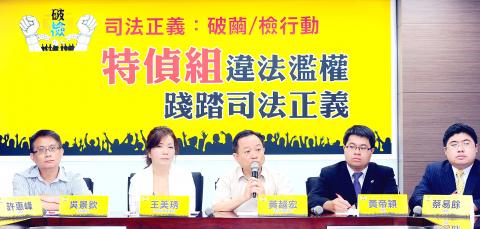Legal experts yesterday filed a lawsuit against the Supreme Prosecutors’ Office Special Investigation Division (SID) and Prosecutor-General Huang Shih-ming (黃世銘) for allegedly following illegal procedures in their investigation of alleged influence peddling involving Legislative Speaker Wang Jin-pyng (王金平).
The SID and Huang have violated the Communication Security and Surveillance Act (通訊保障及監察法), the Personal Information Protection Act (個人資料保護法) and the Civil Servant Service Act (公務人員服務法), Huang Yueh-hung (黃越宏), the publisher of the Journal on the Rule of Law (法治時報), said before filing a lawsuit at the Taipei Prosecutors’ Office yesterday morning.
The SID on Friday accused Wang, former minister of justice Tseng Yung-fu (曾勇夫) and Taiwan High Prosecutors’ Office head prosecutor Chen Shou-huang (陳守煌) of influence peddling for Democratic Progressive Party (DPP) Legislator Ker Chien-ming (柯建銘), sparking widespread public discussion over politicians’ lobbying and what appeared to be an orchestrated political vendetta.

Photo: Chang Chia-ming, Taipei Times
SID and Huang violated the law at least nine times, Huang and other lawyers told a press conference yesterday.
Wiretapping Ker in a prove into allegations of embezzlement did not mean the information the SID accidentally obtained during the surveillance could be used in a different case regarding lobbying, nor could the division publish the full text of the raw intelligence in a press release, Huang said.
The division’s referral of Tseng to the Control Yuan violated the Public Functionaries Discipline Act (公務員懲戒法), he said.
Additionally, the division’s request for Wang’s telephone records and its publication of base station locations for Wang’s phone calls violated the Personal Information Protection Act, Huang said.
Since Prosecutor-General Huang Shih-ming said he reported the case to President Ma Ying-jeou (馬英九) on Aug. 31, “it proved that Ma was aware of the SID’s abuse of wiretapping, but has not done anything to stop the practice,” lawyer Huang Di-ying (黃帝穎) said.
The development of the investigation showed that the SID has become hired thugs for politicians to persecute their rivals, he said.
“I think it is time for the Legislative Yuan to think about abolishing the division — after the new [legislative] session begins next week,” Huang Di-ying said.
Wu Ching-chin (吳景欽), an associate professor of law at Aletheia University, agreed with Huang’s recommendation, saying that the SID had pressed charges against many former DPP government officials, but most of the cases were either dropped or the defendants were found not guilty.
“With its poor efficiency and conviction rate, the division has now become only a political tool and should be abolished,” Wu said.
In June, the Taiwan High Court found Ker not guilty of embezzlement in a case stemming from 1997 when he was general manager of Formosa Telecom Investments Co. Wang, Tseng and Chen allegedly sought to have prosecutors not appeal the High Court verdict to the Supreme Court.
Additional reporting by staff writer

Taipei has once again made it to the top 100 in Oxford Economics’ Global Cities Index 2025 report, moving up five places from last year to 60. The annual index, which was published last month, evaluated 1,000 of the most populated metropolises based on five indices — economics, human capital, quality of life, environment and governance. New York maintained its top spot this year, placing first in the economics index thanks to the strength of its vibrant financial industry and economic stability. Taipei ranked 263rd in economics, 44th in human capital, 15th in quality of life, 284th for environment and 75th in governance,

Greenpeace yesterday said that it is to appeal a decision last month by the Taipei High Administrative Court to dismiss its 2021 lawsuit against the Ministry of Economic Affairs over “loose” regulations governing major corporate electricity consumers. The climate-related lawsuit — the first of its kind in Taiwan — sought to require the government to enforce higher green energy thresholds on major corporations to reduce emissions in light of climate change and an uptick in extreme weather. The suit, filed by Greenpeace East Asia, the Environmental Jurists Association and four individual plaintiffs, was dismissed on May 8 following four years of litigation. The

A former officer in China’s People’s Liberation Army (PLA) who witnessed the aftermath of the 1989 Tiananmen Square massacre has warned that Taiwan could face a similar fate if China attempts to unify the country by force. Li Xiaoming (李曉明), who was deployed to Beijing as a junior officer during the crackdown, said Taiwanese people should study the massacre carefully, because it offers a glimpse of what Beijing is willing to do to suppress dissent. “What happened in Tiananmen Square could happen in Taiwan too,” Li told CNA in a May 22 interview, ahead of the massacre’s 36th anniversary. “If Taiwanese students or

The New Taipei City Government would assist relatives of those killed or injured in last month’s car-ramming incident in Sansia District (三峽) to secure compensation, Mayor Hou You-yi (侯友宜) said yesterday, two days after the driver died in a hospital. “The city government will do its best to help the relatives of the car crash incident seek compensation,” Hou said. The mayor also said that the city’s Legal Affairs, Education and Social Welfare departments have established a joint mechanism to “provide coordinated assistance” to victims and their families. Three people were killed and 12 injured when a car plowed into schoolchildren and their